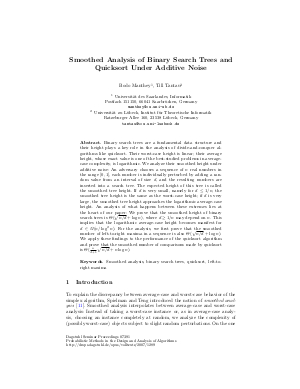Smoothed Analysis of Binary Search Trees and Quicksort Under Additive Noise
Authors Bodo Manthey, Till Tantau
-
Part of:
Volume:
Dagstuhl Seminar Proceedings, Volume 7391
Part of: Series: Dagstuhl Seminar Proceedings (DagSemProc) - License:
 Creative Commons Attribution 4.0 International license
Creative Commons Attribution 4.0 International license
- Publication Date: 2007-12-18
File

PDF
DagSemProc.07391.3.pdf
- Filesize: 294 kB
- 19 pages
Document Identifiers
Subject Classification
Keywords
- Smoothed Analysis
- Binary Search Trees
- Quicksort
- Left-to-right Maxima
Metrics
- Access Statistics
-
Total Accesses (updated on a weekly basis)
0PDF Downloads0Metadata Views
Abstract
While the height of binary search trees is linear in the worst case, their average height is logarithmic. We investigate what happens in between, i.e., when the randomness is limited, by analyzing the smoothed height of binary search trees: Randomly perturb a given (adversarial) sequence and then take the expected height of the binary search tree generated by the resulting sequence. As perturbation models, we consider partial permutations, where some elements are randomly permuted, and additive noise, where random numbers are added to the adversarial sequence. We prove tight bounds for the smoothed height of binary search trees under these models. We also obtain tight bounds for smoothed number of left-to-right maxima. Furthermore, we exploit the results obtained to get bounds for the smoothed number of comparisons that quicksort needs.
Cite As Get BibTex
Bodo Manthey and Till Tantau. Smoothed Analysis of Binary Search Trees and Quicksort Under Additive Noise. In Probabilistic Methods in the Design and Analysis of Algorithms. Dagstuhl Seminar Proceedings, Volume 7391, pp. 1-19, Schloss Dagstuhl – Leibniz-Zentrum für Informatik (2007)
https://doi.org/10.4230/DagSemProc.07391.3
BibTex
@InProceedings{manthey_et_al:DagSemProc.07391.3,
author = {Manthey, Bodo and Tantau, Till},
title = {{Smoothed Analysis of Binary Search Trees and Quicksort Under Additive Noise}},
booktitle = {Probabilistic Methods in the Design and Analysis of Algorithms},
pages = {1--19},
series = {Dagstuhl Seminar Proceedings (DagSemProc)},
ISSN = {1862-4405},
year = {2007},
volume = {7391},
editor = {Martin Dietzfelbinger and Shang-Hua Teng and Eli Upfal and Berthold V\"{o}cking},
publisher = {Schloss Dagstuhl -- Leibniz-Zentrum f{\"u}r Informatik},
address = {Dagstuhl, Germany},
URL = {https://drops.dagstuhl.de/entities/document/10.4230/DagSemProc.07391.3},
URN = {urn:nbn:de:0030-drops-12893},
doi = {10.4230/DagSemProc.07391.3},
annote = {Keywords: Smoothed Analysis, Binary Search Trees, Quicksort, Left-to-right Maxima}
}
